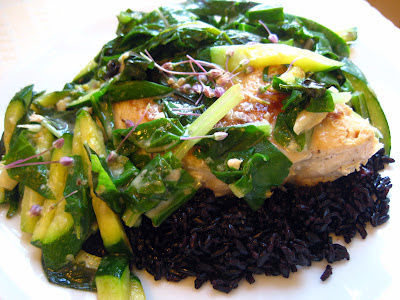Seriously. The most amazing. Go to Paris and see. (I know. Such terrible homework assignments.)
Post Paris, come home and make this.
Ingredients
Olive oil
1 large or 2 small shallots, chopped (about 4 tbsp)
2 cloves garlic, chopped
1 tsp grated or minced ginger
2 spoonfuls of good-quality curry powder
4 gypsy peppers, sliced lengthwise into strips (or sub 2 bell peppers)
1 zucchini, quartered lengthwise and thickly sliced
4 tbsp coconut milk
Chicken or veggie broth
About .6 lbs opah (moonfish), tilapia, or salmon, cut into 1-2" cubes (you want them all about the same size so they cook in the same amount of time)
A few leaves of cilantro, for garnish (optional)
Heat a pan over medium heat. Add a glug of olive oil and sauté half the shallot, half the garlic, and all of the ginger until they soften slightly. Add a spoonful of curry powder, stir for about 10 seconds till it turns fragrant, then add the veggies and toss to coat. Sauté for a minute, adding a little more oil if necessary, then add 2 tbsp coconut milk, a slosh of broth, and a pinch of salt. Stir, bring to a simmer, and cover the pan. Turn the heat down slightly and let cook about 10 minutes, stirring occasionally, until the peppers soften their shape and the zucchini is tender. Set aside.
Meanwhile, heat another pan over medium heat, add a generous glug of olive oil, and sauté the remaining shallot and garlic until they soften. Add a spoonful of curry powder, toast for about 10 seconds, then add the fish. Sprinkle with salt, stir, and saute until it's cooked on all sides. Add 2 tbsp coconut milk, a generous slosh or two of broth (you want enough to make some sauce to spoon over your rice), and simmer, stirring occasionally, until the fish is just barely cooked through.
Serve the fish and veggies together (you can mix them in a pan or just layer them in bowls) with brown rice and a glass of Barbera.
Serves 2.





























